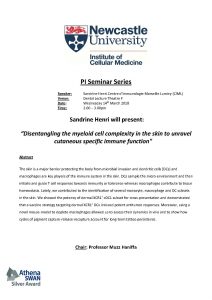
Click here for larger version: PI Seminar -S Henri – 14 3 18

The Wellcome Trust recently announced that it was changing its public engagement strategy: https://wellcome.ac.uk/news/public-engagement-fund-relaunch-tighter-focus-outcomes / https://wellcome.ac.uk/news/wellcomes-approach-engaging-public-going-change
Today, 5th March 2018, the Wellcome has launched its new Public Engagement Fund: https://wellcome.ac.uk/funding/public-engagement-fund
The revised fund supports projects of between £25K and £3m for up to 3 years.
Wellcome are looking for creative approaches to engage the public but these must align with their PE goals.
The proposal, must include:
Resources for those interested in this opportunity include;
Wellcome’s public engagement goals: https://wellcome.ac.uk/what-we-do/our-work/public-engagement
“What good proposals looks like” (pdf): https://wellcome.ac.uk/sites/default/files/public-engagement-fund-what-good-proposals-look-like.pdf
Upcoming deadlines:
Please ensure to read the full call details via the link above.
Budget: £2.2m total with approx. 4 projects supported
Duration: Up to 3 years
Deadline: 9th April 2018, outline submission via email – 09th May 2018 full call deadline via Je-S
The Medical Research Council (MRC) and the National Research Foundation (NRF) of Kenya are inviting research proposals to the Newton Fund’s UK-Kenya Joint Partnership on Non-Communicable Diseases. This initiative will provide funding for high quality collaborative research projects focused on addressing non-communicable diseases (NCDs) in Kenya.
The proposal should be developed by a UK PI and a Kenyan PI. Principal Investigators may only submit one application to this scheme as principal investigator, but may be involved in more applications if listed as a co-investigator.
Under this first MRC-NRF initiative, research proposals must specifically address one or more of the following diseases:
The funders are welcoming research proposals across the spectrum of research activities including, but not limited to, basic discovery research, epidemiology, understanding the mechanisms of disease, novel detection and diagnosis, development of therapeutics/interventions. Proposals must fall within the remits of both funders.
Research proposals must seek to generate scientific outcomes of relevance to the prevention, treatment, management and/or control of the above listed diseases in Kenya. The purpose of this call is to support research projects; however, the funders are also encouraging projects that incorporate elements of capacity building within them.
All proposals for this call must meet Newton Fund requirements. In particular, proposals must be compliant with Official Development Assistance (ODA) funding rules.
Please ensure to read the full call details and guidance documents, available through the link above.
9 April 2018, 5pm
Education Endowment Foundation (EEF) & Wellcome Trust
Improving Science Education
https://wellcome.ac.uk/funding/improving-science-education
We are looking for interventions or approaches that are informed and supported by encouraging evidence of impact on attainment and/or progression. Interventions should focus on science attainment and/or progression and we are particularly interested in approaches that are likely to be beneficial for disadvantaged learners.
Interventions should be practical for schools and we expect project teams to include relevant expertise to ensure that approaches are feasible for schools to deliver.
The Wellcome Trust and EEF have undertaken pieces of work that we hope will support applications to this funding scheme and these can be found on the website.
Project criteria
Successful proposals will:
Type of projects
We are interested in projects that either:
How to apply
To submit an application please register for the Improving Science Education Round on the Apply Now section of the EEF website and complete the online form before 9th April 2018.
We are expecting a high level of interest in this round. The Application Form is designed to be short and easy to fill in.
Following the closing date, we will review the applications received against our criteria. We will begin conversations with a small number of the most promising proposals, with a view to jointly developing a project and evaluation plan with the independent evaluator that will be appointed by the EEF.
We do not expect to make final funding decisions until the end of June 2018.
Our next INE journal club will be on Thursday 22nd February between 1pm-2pm. Journal club will be held in the large meeting room M1.025, located on the 1st floor corridor that links the Cookson and Leech Buildings. Lunch will be provided.
Rob Usher will be presenting the paper:
The atypical chemokine receptor 2 limits renal inflammation and fibrosis in murine progressive immune complex glomerulonephritis